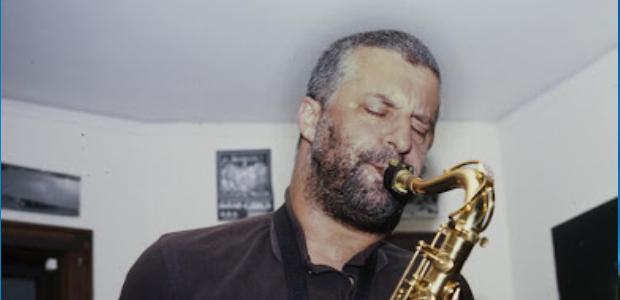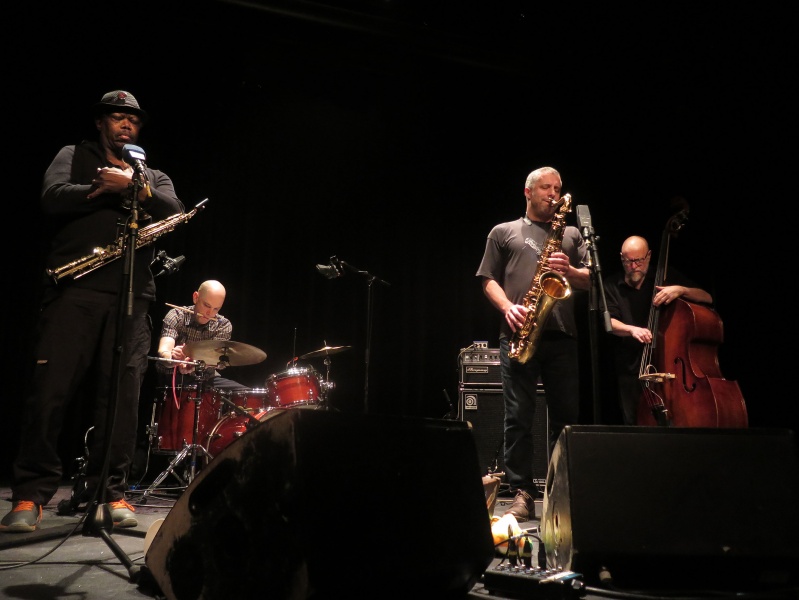You can't pretend to be someone you are not - interview with Rodrigo Amado

Was the last year difficult for you as an artist?
Rodrigo Amado: No, not really. This pandemic has offered me the opportunity to work on a lot of projects that were being delayed. Also, I was able to practice a lot more and go back to my photography archive, getting deep in both disciplines, music and photography. Just the fact that I had a lot of time to reflect on life and on what I'm doing as an artist, was kind of amazing. I would also say it was difficult, of course, but in the sense that we are now becoming more aware of all the serious problems affecting society and the planet. But this is more related to me as a human being, not an artist.
Have you had time for something which you couldn't do before lockdowns?
RA: Yes, for sure. First of all it allowed me to spend some beautiful time with my family. Definitely important. Also, for a long time I was considering getting a new horn, a vintage one. But these are really hard to find and are very expensive. You need to try many saxophones to find one that really connects with your playing and this involves a lot of search and attention. Last year, in the middle of the full lockdown, I was able to track one of these instruments, in Paris, that had all the characteristics I was looking for. So, I just boarded on an empty plane and flew to Paris to try it. And I finally got it. It's a Super Balanced Action from Selmer, built in 1951. Magic instrument.
What is the situation right now in Lisbon and in Portugal regarding playing concerts?
RA: Right now, the situation is rather calm, with things slowly getting closer to normal. At least, concerts are happening, even if they happen within a controlled environment. I've been playing quite regularly.
In May you released your new album with Joe McPhee, Kent Kessler and Chris Corsano. Could you tell me something about this project? When was it recorded and what was the main idea?
RA: This american quartet has slowly become my main project, mostly because it's the one with more potential for touring the European circuit. Other projects, like Motion Trio, The Attic or Refraction Quartet are also important, but they can not yet match the impact of this group. I formed the "This Is Our Language Quartet" in 2012 with the specific objective of organizing something with Joe McPhee. I really wanted to play with him. For some years, we would cross paths in New York or in some Festival, and his energy was always super positive, very empathic. When I invited him, he immediately accepted. After that, I started thinking about who the other players should be. I chose Corsano for his versatility and for his capacity of making abstract sound concrete. His impressionistic drumming seemed to me the perfect match for Joe's organic language. After that, I realized I needed someone for the bass chair that could ground the band, connecting it to earth so it didn't sound too abstract. Kent was the perfect choice. This new album was recorded live at the mighty Jazzhouse in Copenhagen, in 2017. It was one of those magic nights when you feel the music is happening by itself, and I knew right then that I wanted to release that recording. Through time the album has become for me a symbol for the resistance against the loss of freedom. The name of the album, "Let The Free Be Men", taken from a graphic poem by EM de Melo e Castro, means exactly that - a shout against the very real risk that we, as humans, may loose our beloved freedom. In fact that process has already begun, and everyday we loose a bit more of our freedom in ways that are not immediately perceptible and in ways that we are led to believe that are acceptable. That's why I say: Resist!!

Cover painting on this album is very interesting. The texture is intriguing…
RA: The cover painting is from one of the most important portuguese painters of the last century, Eduardo Batarda. I really loved his work and when I was researching for this album's cover I came across this specific painting. Immediately I had the feeling that it was "it". Of course the reproduction on the covers of the CD and LP can not possibly match the original, but I'm quite happy with the result and it turned out to be a beautiful homage to Batarda's art. He also really liked the music.
Just around the corner there is another new album which will be released soon with your regular band Motion Trio. What is your interpretation of the title "The Field"?
RA: "The Field" refers to the miracle of getting together with someone you never met in your life, Alexander von Schlippenbach, go on stage just a few hours after meeting him and record the music you can hear on this album. Throughout the concert I had the feeling we were playing the exact same music. Sometimes I was leading the way, other times it was Alex. But, no matter the risks we were taking (and we were taking them all), we never ever lost the musical thread that represents the heart of the music. Like being "in the zone", in a field of energy that connects all dots. Playing with Motion Trio and Alex, I was able to use discordant notes or phrases, knowing they would inflect the musical direction the way I wanted, because I knew they would always know what to do with it and never feel lost. Well... this represents an unusual degree of musical freedom, even for the standards of improvised music.
How is it to play music with Alexander von Schlippenbach? Is he a big inspiration for you?
RA: Playing with Alex feels like an absolute privilege. For me it's very rare to feel comfortable playing with a pianist. Only other similar experience I had was playing with Matthew Shipp. Also, Alex was one of our musical heroes, for many many years. His trio and quartet music was foundational to our growth as musicians. Besides that, meeting him in person was every bit as special as I imagined it would be. Musicians like him and Joe McPhee are present day Shamans, representing a pure source of dignity, creativity and love. No words to describe how important this is for me.

The album was recorded during the Vilnius Jazz Festival in 2019. Have you done any arrangements before the concert?
RA: Not at all. As usual with every project I lead, the music is totally improvised. We never ever talk about what we are going to play. For me, this guarantees the truth of this music. You can't fake it, you can't pretend to be someone you are not. Everything you are is layed out, transparent, on stage.
I think that some people who listen to your music don't know that you are also a photographer. What is for you most interesting in photography? Why did you decide to make photos professionally?
RA: Besides the artistic interest I always had in photography, a strong fascination since I was young, for me photography represents a discipline that complements music. Music is essentially a group activity, whereas with photography I can create alone. This became very important to me when music life started to get really intense. I am the kind of person who enjoys being alone, and when I was young I would do long travels just by myself. The fact that I was travelling alone always allowed me greater freedom and it created opportunities for adventure that I would not have if I was travelling with someone. Later in life, I felt the need to return to this "solitary" energy, and photography gave me that. The fact that I started to do exhibitions, producing and selling my work also had to do with balancing finances, which can become a bit fragile working only as an improvising musician.
You've released a book "Un Certain Malaise". I've read it was inspired by the work of Herberto Helder who was a poet. Could you tell me more about this project?
RA: "Un Certain Malaise" was created in the middle of intense touring in Europe and Russia. Returning to cities like Paris, Berlin, Copenhagen or Moscow, I started feeling some common traces of change, mostly for the worse, like as if those cities were loosing their innocence, their poetic vibe, and becoming more tough, more arid. So, "Un Certain Malaise" refers to this ill energy that slowly started affecting most of the major European cities. Herberto Helder wrote frequently about these matters and he was himself a misfit. For the book, I invited Gonçalo M Tavares, a brilliant writer from a newer generation, to write whatever he felt like in relation to my images. When he sent me his texts, I was blown away by the evocative power of his words, by how intensely he could summon pure emotions with just a few words. All done by the way he sequences those words, as much as for the words themselves. A huge inspiration.
Do you have any plans to go to Poland and play some music?
RA: I'll be touring in October this year with Humanization Quartet and we have a date at the Dragon Club in Poznan for the Spontaneous Music Tribune Festival. Looking forward to that, as I am to return to Warsaw and Krakow. Poland always represents an unusually intense experience when it comes to improvised music. Respect!
- Aby wysyłać odpowiedzi, należy się zalogować.







